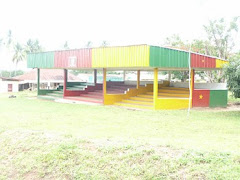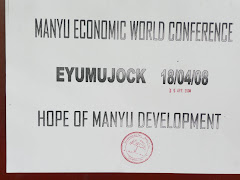
In the United States, Manyu community organizations were the first to organize themselves within the larger Cameroon community. They did so by bringing their people who live in close proximity together and have a shared interest. They also drew inspiration and lessons from their parent organizations like MECA back home. Quite often, the interest of these new found organizations were to build coalitions for a common cause or assisting in the social, economic and cultural development of the homeland and division. In attempt to formulate policies and organize, these associations elect leaders, hold annual conventions, develop bylaws and seek for resources through member contributions and charity.
Despite the good intentions of these bodies to foster development back home, their foundations and reason d’être began to crumble. The organizations started developing unmanageable conflicts, derailing gains and impeding development efforts and initiatives. We all know too well that the potential for conflicts exists when and where people have contact. We also know that some Manyu men often display a pesky, aggravating personality, espouse a sense of superiority, and stubbornly refuse to give in during disputes. This display of non-negotiable skills and macho attitude has finally caught up with some in the leadership of the Diaspora organizations.
Although we tend to believe we know what causes some conflicts to emerge in our communities, we forget to imagine conflicts can be used effectively by groups as a strategy to bring desired changes. Indeed, not all conflicts are bad, although unmanaged conflicts which tend to linger for a long time can be a threat to the building blocks of a community group and thereby render it less effective as we may see in some cases.
Within the Manyu Diaspora community, we have witnessed a trend where individuals cultivate a dislike and disdain for certain people with whom they come into frequent contact. As a result of harbored conflicts, certain behaviors are manifested in public within the community and the long term effect seems to be aggression, disrespect and disregard to community building, solidarity and the unique thread that binds us all together “the Manyu culture and eyongemot”.
How then can the Manyu Diaspora community address its conflicts without demonizing one another and extending such aggression and disrespect to the children? Have we finally lost the moral fabric of a Grande Manyu community that was founded, carved and preserved by those who came before us? Is it ordained that every Manyu child must be a leader, Chief or Sesekou? These are some of the intrinsic questions we must reflect on.
The Manyu Diaspora like never before is today interwoven with conflict as a result of ethnocentrism. We tend to believe that our way of thinking and doing things is not only the best but the only right way. It is a belief that fuels a false sense of superiority even amongst our peers and thereby shows the lack of a shared sense of humility. We are therefore threatened by division and conflicts, dividing friends and families. At the very least, we fail to accomplish much as we compete, take sides on issues and lose sight of our common struggles and values. Today, there tend to be increased bitterness, alienation and divisions that will have long lasting impacts upon future cooperation amongst individuals holding positive views.
The way forward is for us to restructure our community organizations, deal with internal dissension and allow dissatisfied members to voice their complaints and opinions without penalty. Regardless of our levels of education, economic base or family heritage, we must recognize we approach life from different perspectives. It is therefore imperative to understand, if conflicts are not managed early and well, they tend to bring disinterest, lack of action and a breakdown of the community. Ultimately, members tend to withdraw and find it unwilling to participate in group projects. Although the best conflict control may be catching it early, avoidance whenever possible may be the best solution. As in the case whereby the conflicts already exist, a procedural resolution by reconciliation and/or compromise is the most appropriate solution.
For Manyu Diaspora, and in view of the conflicts harboring around the communities, the only option left on the table is to come to terms to negotiate for the interest of the community and division. Otherwise, if sharing common goals is no longer an option to those who have developed an ingrained hatred for their brethren, then living with conflicts to attain power and name recognition may be the only solution. The question is for how long and how far? That is a price too high to pay since it involves compromise and capitulation. Are we willing to compromise and capitulate for grand Manyu as we usher into a new year? The gods of Manyu will be watching and listening keenly.
Despite the good intentions of these bodies to foster development back home, their foundations and reason d’être began to crumble. The organizations started developing unmanageable conflicts, derailing gains and impeding development efforts and initiatives. We all know too well that the potential for conflicts exists when and where people have contact. We also know that some Manyu men often display a pesky, aggravating personality, espouse a sense of superiority, and stubbornly refuse to give in during disputes. This display of non-negotiable skills and macho attitude has finally caught up with some in the leadership of the Diaspora organizations.
Although we tend to believe we know what causes some conflicts to emerge in our communities, we forget to imagine conflicts can be used effectively by groups as a strategy to bring desired changes. Indeed, not all conflicts are bad, although unmanaged conflicts which tend to linger for a long time can be a threat to the building blocks of a community group and thereby render it less effective as we may see in some cases.
Within the Manyu Diaspora community, we have witnessed a trend where individuals cultivate a dislike and disdain for certain people with whom they come into frequent contact. As a result of harbored conflicts, certain behaviors are manifested in public within the community and the long term effect seems to be aggression, disrespect and disregard to community building, solidarity and the unique thread that binds us all together “the Manyu culture and eyongemot”.
How then can the Manyu Diaspora community address its conflicts without demonizing one another and extending such aggression and disrespect to the children? Have we finally lost the moral fabric of a Grande Manyu community that was founded, carved and preserved by those who came before us? Is it ordained that every Manyu child must be a leader, Chief or Sesekou? These are some of the intrinsic questions we must reflect on.
The Manyu Diaspora like never before is today interwoven with conflict as a result of ethnocentrism. We tend to believe that our way of thinking and doing things is not only the best but the only right way. It is a belief that fuels a false sense of superiority even amongst our peers and thereby shows the lack of a shared sense of humility. We are therefore threatened by division and conflicts, dividing friends and families. At the very least, we fail to accomplish much as we compete, take sides on issues and lose sight of our common struggles and values. Today, there tend to be increased bitterness, alienation and divisions that will have long lasting impacts upon future cooperation amongst individuals holding positive views.
The way forward is for us to restructure our community organizations, deal with internal dissension and allow dissatisfied members to voice their complaints and opinions without penalty. Regardless of our levels of education, economic base or family heritage, we must recognize we approach life from different perspectives. It is therefore imperative to understand, if conflicts are not managed early and well, they tend to bring disinterest, lack of action and a breakdown of the community. Ultimately, members tend to withdraw and find it unwilling to participate in group projects. Although the best conflict control may be catching it early, avoidance whenever possible may be the best solution. As in the case whereby the conflicts already exist, a procedural resolution by reconciliation and/or compromise is the most appropriate solution.
For Manyu Diaspora, and in view of the conflicts harboring around the communities, the only option left on the table is to come to terms to negotiate for the interest of the community and division. Otherwise, if sharing common goals is no longer an option to those who have developed an ingrained hatred for their brethren, then living with conflicts to attain power and name recognition may be the only solution. The question is for how long and how far? That is a price too high to pay since it involves compromise and capitulation. Are we willing to compromise and capitulate for grand Manyu as we usher into a new year? The gods of Manyu will be watching and listening keenly.
Simon Etta
MEDWC Volunteer



























